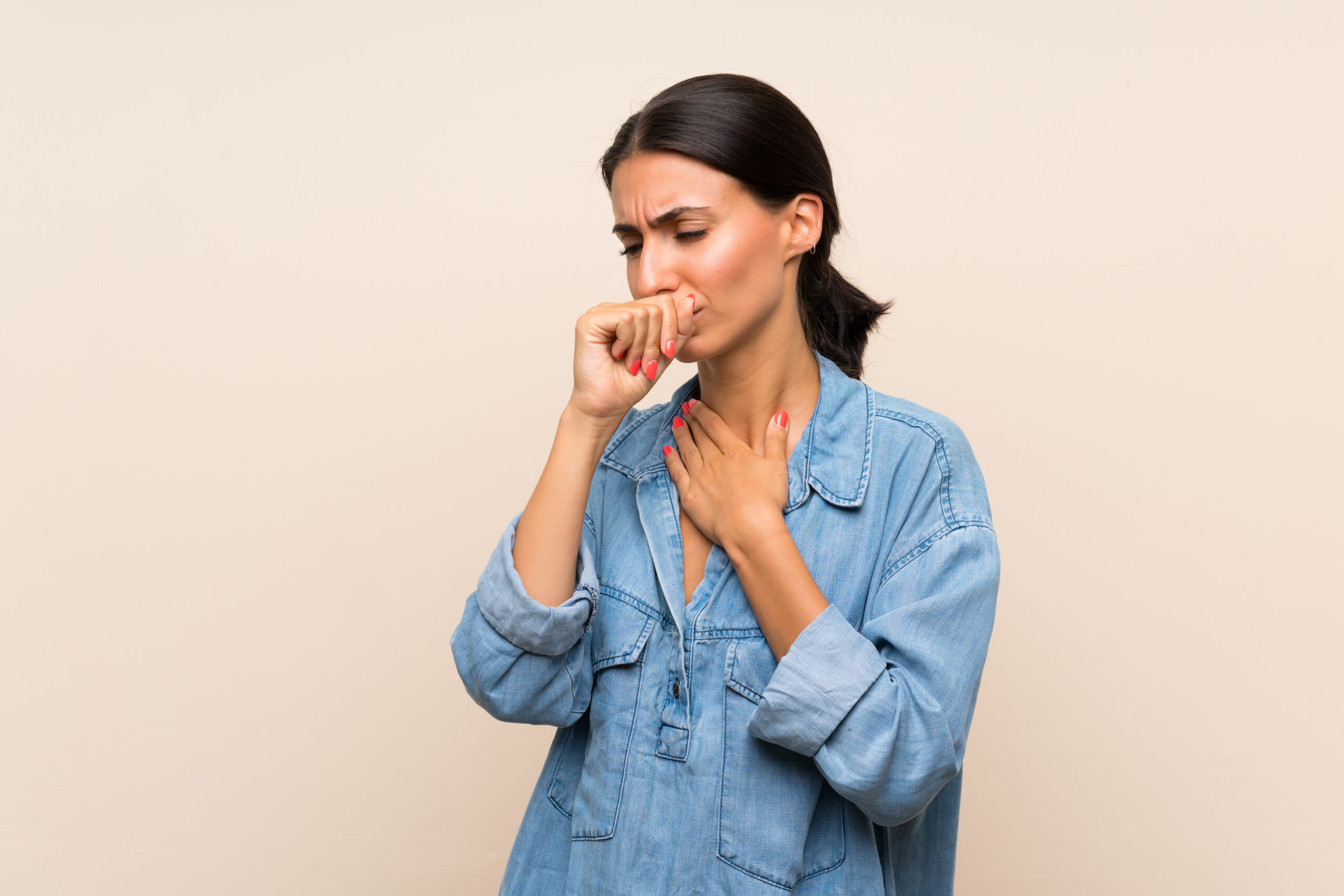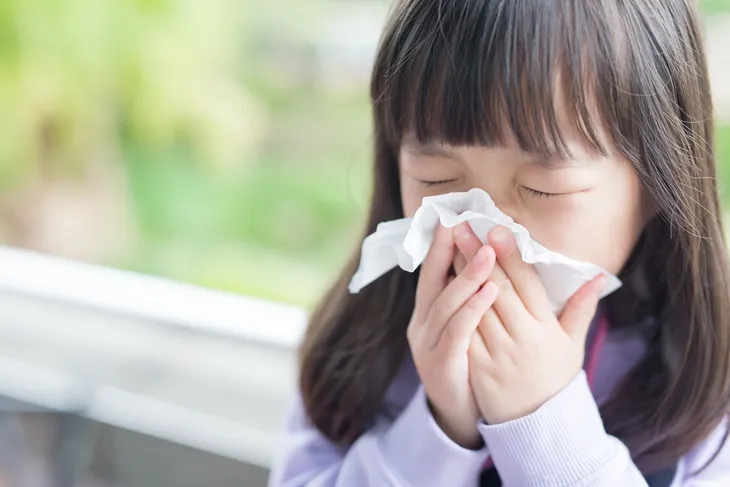- Coughing is a natural reflex that can occur voluntarily or involuntarily.
- It’s a response to irritation in the throat but the underlying cause can vary.
- Sometimes it’s caused by something like dust irritation but it can also be a symptom of infection or a health condition.
- Figuring out what type of cough you have will help determine if it’s serious.
Most people have experienced a cough at least once in their life. Some coughs are merely a natural reaction to irritants in the throat, such as dust, and other times it’s a symptom of an infection or health condition.
Determining what type of cough you have is important as some can go away on their own, while others require medical treatment. Some coughs are also a sign of a medical emergency. Follow along as we break down the different types of coughs and how to know when your cough is serious.
Why Do We Cough?
Coughing is a natural reaction that occurs when something is irritating the throat. Healthline explains that when irritation occurs, a signal is sent from your nervous system to the brainstem. The brainstem then communicates to the muscles in your abdomen and chest to contract and push out air, resulting in a cough.
Coughing is also a vital way your body protects itself from irritants like mucus and allergens. Certain characteristics of the cough as well as any accompanying symptoms can be key indicators of what type of cough you have. Let’s look at how coughs are categorized next.
Types of Coughs
Coughing can be a natural reflex, such as swallowing the wrong way, if you develop a tickle in the throat, or if something is stuck in your throat. But coughing can also be a symptom of a variety of illnesses. If the reason for your cough isn’t immediately obvious, there are some characteristics you can look out for that may indicate what type of cough you have. Healthline says a cough can be described by the following:
- Grade: Helps you determine how bad the cough is. Is it a nuisance or is it debilitating?
- Duration: Helps you determine if it’s acute or chronic. How long have you had the cough?
- Behavior: Helps you determine when and why the cough is occurring. Does it occur in the morning or at night? After eating or other activities?
- Characteristics: Helps determine how the cough sounds and feels. Is it wet or dry?
- Associated effects: Helps determine if you have any other accompanying symptoms. Do you have a fever or are you vomiting?
 Shutterstock/Emily frost
Shutterstock/Emily frostCommon Symptoms of a Dry Cough
As the name suggests, this type of cough is dry, meaning it doesn’t involve coughing up mucus. You’ll know it’s a dry cough if no phlegm is produced while coughing.
Dry coughs may also cause a tickling sensation in the throat, which Healthline says can trigger your cough reflex. Because of this, a dry cough may cause hacking coughs and coughing fits. They typically develop when your respiratory tract is irritated or inflamed.
What Causes a Dry Cough?
Upper respiratory infections, such as the cold or flu are common causes of a dry cough. If this is the cause, the cough will typically go away on its own once your body fights off the infection. It may also be caused by allergies, medications, or exposure to irritants (such as dust, smoke, or air pollution). If the cough becomes chronic, on the other hand, there may be another cause.
Medical News Today says that if your dry cough becomes chronic it may be caused by asthma or gastroesophageal reflux disease (GERD). In rare cases, it may be a sign of lung cancer. If you’re concerned about your cough, never hesitate to contact your doctor.
Remedies for a Dry Cough
If a tickling sensation is causing your dry cough, Medical News Today says drinking water may help ease the cough. If it’s caused by a viral infection, over-the-counter cough medicine or throat lozenges may help reduce the cough.
Sometimes dry air may make the cough worse, so you may get some relief by adding moisture to the air. This can be achieved by running a cool-mist humidifier. Healthline also notes that if you have accompanying symptoms such as pain or heartburn, you should talk to your doctor. You may require prescription medicines or further testing to determine the underlying cause.
Common Symptoms of a Wet Cough
A wet cough typically involves mucus. Healthline explains wet coughs are considered productive coughs because it brings up mucus from the lungs. Telltale signs that you have a wet cough is coughing up phlegm, though the source says it can also feel like you have something dripping down your throat (or chest) or as if there’s an object stuck in your throat.
The source explains that the cough sounds wet because “of the moisture present when mucus comes up from your respiratory system.” Other symptoms that may accompany a wet cough include a runny nose, post-nasal drip, and fatigue.
What Causes Wet Coughs?
Wet coughs can be acute or chronic. Healthline explains that in adults, an acute cough typically lasts fewer than 3-weeks, whereas a chronic cough lasts for more than 8-weeks. So what causes a wet cough in the first place?
The source says several infections may cause a wet cough such as the common cold or flu. But it can also be due to pneumonia, COPD, bronchitis (acute or chronic), or emphysema. Wet coughs may also be associated with asthma.
Remedies for a Wet Cough
Treating a wet cough is similar to treating a dry cough in that you may help ease your symptoms by adding moisture to the air and using over-the-counter cough medicine. OTC medicines, such as cough drops, chest rubs, and pain relievers may be effective in easing your cough.
Medical News Today also says staying hydrated may help “a wet cough stay productive and ease the symptoms of a cold.” Honey may also help ease a cough. If your wet cough is caused by a bacterial infection then you may need prescription antibiotics. Contact your doctor if you suspect a bacterial infection.
Whooping Cough
Another type of cough is whooping cough, also known as pertussis. Whooping cough is a highly contagious bacterial infection that typically affects newborns or individuals who aren’t vaccinated.
Medical News Today says the infection is usually accompanied by cold or flu-like symptoms, as well as an “aggressive and painful cough.” The cough typically produces a “whoop” sound, which occurs when the person expels all the air from their lungs.
Infants are most at risk as they often have difficulty fighting the infection. It can even be life-threatening. The best way to protect your child from whooping cough is to get vaccinated, which is available for children ages 2-months and older.
How to Treat Whooping Cough
Since whooping cough is a bacterial infection, the only way to treat it is with antibiotic medications. You will need a prescription from your doctor. Since it can be life-threatening, especially for young infants, it’s important to see your doctor as soon as symptoms develop.
Healthline also notes that whooping cough is very contagious, so family members and caregivers may need to be treated too. Early intervention is key for the best outcome.
Croup Cough
Croup is an infection of the upper airway. The Mayo Clinic says the telltale sign of croup is a cough that sounds like barking. It may also be accompanied by fever, hoarse voice, or noisy or labored breathing. Symptoms are often worse at night and typically last 3- to 5-days.
Croup is most commonly caused by a viral infection, and is rarely bacterial. It’s most common in young children. Luckily, most cases are mild but sometimes it can be serious if the airways swell enough to cause breathing problems. If your child is having difficulty breathing, seek medical help immediately.
When Is a Cough Serious?
Sometimes it can be hard to know if a cough is serious or a symptom of a mild infection, such as the common cold. However, there are a few things to keep in mind that may indicate a cough is more serious. The Mayo Clinic says you should contact your doctor if the cough doesn’t go away after a few weeks or if it’s accompanied by the following:
- Thick, greenish-yellow phlegm
- Wheezing
- Fever
- Shortness of breath
- Fainting
- Ankle swelling
- Weight loss
When Is a Cough an Emergency?
Sometimes a cough requires immediate emergency care. If a cough is caused by choking, this is an emergency. It’s vital to perform the Heimlich maneuver and call 911. Keep in mind, if the person is choking severely, they will not make a sound when they cough. Other signs of an emergency include:
- Coughing up blood or pink-tinged phlegm
- If the cough is accompanied by chest pain
- If you’re having difficulty breathing or swallowing.















